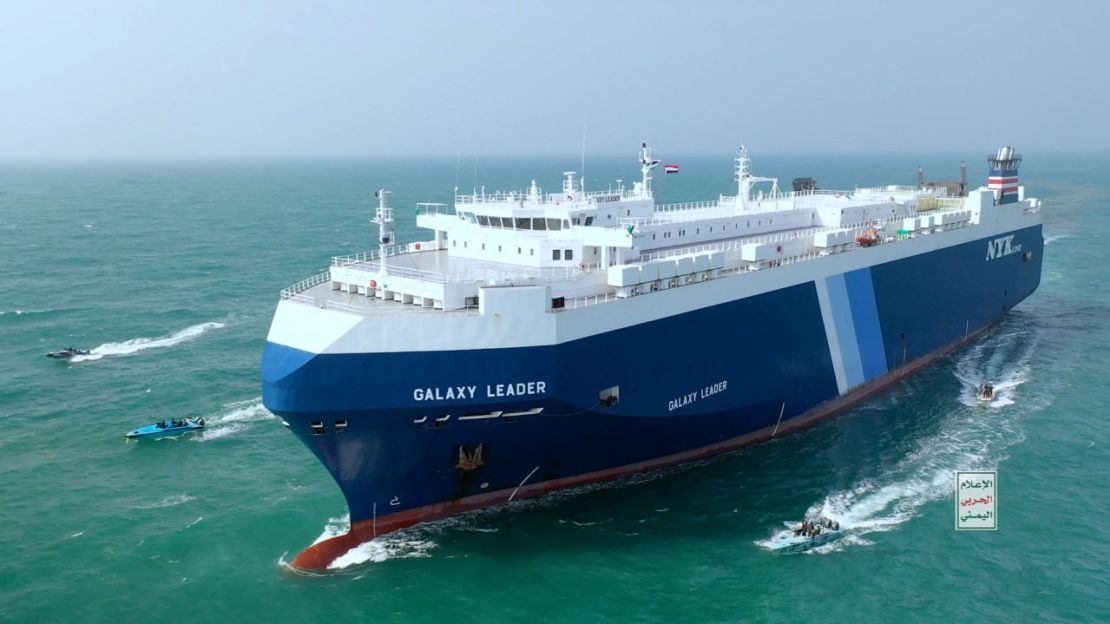Hope is fading for the imminent return of the international crew of the cargo ship hijacked by the Houthis in November, with a senior Filipino diplomat saying he does not expect a release until the war in Gaza is over, while the Houthis say the fate of the sailors is now in Hamas’ hands.
A Houthi-owned helicopter hijacked the Galaxy Leader cargo ship on November 19 in the Red Sea, as rebel gunmen laid siege to the vessel and took the ship’s crew of 17 Filipinos, two Bulgarians, three Ukrainians, two Mexicans and a Romanian hostage.
It’s now been more than 116 days since the hijacking, and according to a senior Filipino government official, there is no indication that the Houthis are open to releasing them until the hostilities end.
“There’s really not much that can be done to influence them, because the word we get from the Houthis is … that they will keep holding the ship, and all the crewmen, until we see an end to the hostilities in Gaza,” said Eduardo de Vega, the Filipino foreign affairs official overseeing millions of Filipino migrant workers.
Iran-backed Houthi rebels have been striking ships in the Red Sea since late last year, which they say is revenge against Israel for its military campaign in Gaza.
The Houthis said Thursday they had handed over the decision about the release of the Galaxy Leader to Hamas.
“The ship and its crew are in the hands of the brothers in the Hamas resistance movement and the Al-Qassam Brigades,” Houthi spokesman Nasr Al-Din Amer told CNN, saying there were direct and ongoing discussions with Hamas about whether to release them. “We have no claims of our own regarding this vessel,” he said.
De Vega said the Houthis potentially also want official recognition of them as the government of Yemen in exchange for the hostages, but that’s unlikely to happen.
“It will be difficult for any government to recognize a government which attacks ships on the sea,” said de Vega. So, he said, “there is no point to negotiate,” except to ensure humane conditions for the hostages.

The Galaxy Leader cargo ship is escorted by Houthi boats in the Red Sea in this photo released November 20, 2023. Houthi Military Media/Reuters
The Philippines sends nearly half a million seafarers worldwide throughout the year, making up more than one-fifth of maritime manpower. The large numbers mean Filipinos are disproportionately exposed to the dangers posed by Houthis targeting ships in the Red Sea.
Following the hijacking, video released by the militant group showed Houthi commanders greeting the crew and promising to treat them as guests.
“Anything that you need we are ready to provide it for you,” one of them is heard telling the seafarers in the clip.
De Vega says that the crew is being fed – some have even reported weight gain – and there’s no indication of violence. They’re allowed brief, weekly calls with their families, although the identities of the hostages have been kept from the public.
Following the hijacking, video released by the militant group showed Houthi commanders greeting the crew and promising to treat them as guests.
“Anything that you need we are ready to provide it for you,” one of them is heard telling the seafarers in the clip.
De Vega says that the crew is being fed – some have even reported weight gain – and there’s no indication of violence. They’re allowed brief, weekly calls with their families, although the identities of the hostages have been kept from the public.
Most of the crew, and all the Filipinos, are being held on the ship itself and have some freedom to move around on deck. Some other crew members, he said, have at times been held onshore.
“I think it’s in the interest of the Houthis to treat them well. Those people are victims, at the end of the day,” said Mohammed Al-Qadhi, a Cairo-based Yemeni conflict analyst. “They don’t want them to create a bad image about themselves.”
But since the honorary consul is in Aden, home to the internationally recognized Saudi-backed government of Yemen that are rivals to the Houthis, de Vega said it’s a “labyrinthian maze” to get access.
Al-Qadhi suggests that even when the war is over, the Houthis may not immediately release the hostages.
“They don’t want to give concessions right now without getting anything in return, so, I think it’s not likely that they are going to be released unless there is a bigger deal being orchestrated, internationally, regarding Gaza or even with the Houthis themselves,” he said.
At the time of the attack, the Galaxy Leader was operated by Japanese company Nippon Yusen, also known as NYK Line. It is owned by Ray Car Carriers, a company linked to Israeli national Abraham Ungar, according to maritime risk management firm Ambrey Analytics. CNN reached out to both companies for comment.
Normally used to transport vehicles worldwide, the giant roll-on/roll-off vessel has now become a tourist attraction for curious locals who are shuttled out to the massive vessel in small boats.
According to satellite data, about two weeks ago, it was moved from about two kilometers offshore, to just 500 meters now from Yemen’s western port city of Hodeidah.
Source: Scott McClean

